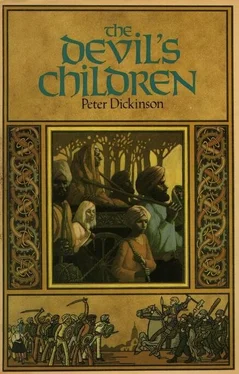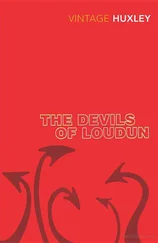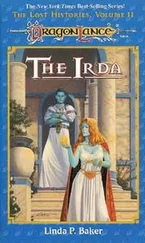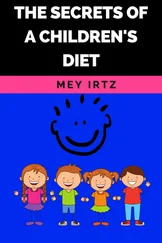Unknown - The Devils Children
Здесь есть возможность читать онлайн «Unknown - The Devils Children» весь текст электронной книги совершенно бесплатно (целиком полную версию без сокращений). В некоторых случаях можно слушать аудио, скачать через торрент в формате fb2 и присутствует краткое содержание. Год выпуска: 2013, Жанр: Старинная литература, und. Описание произведения, (предисловие) а так же отзывы посетителей доступны на портале библиотеки ЛибКат.
- Название:The Devils Children
- Автор:
- Жанр:
- Год:2013
- ISBN:нет данных
- Рейтинг книги:5 / 5. Голосов: 1
-
Избранное:Добавить в избранное
- Отзывы:
-
Ваша оценка:
- 100
- 1
- 2
- 3
- 4
- 5
The Devils Children: краткое содержание, описание и аннотация
Предлагаем к чтению аннотацию, описание, краткое содержание или предисловие (зависит от того, что написал сам автор книги «The Devils Children»). Если вы не нашли необходимую информацию о книге — напишите в комментариях, мы постараемся отыскать её.
The Devils Children — читать онлайн бесплатно полную книгу (весь текст) целиком
Ниже представлен текст книги, разбитый по страницам. Система сохранения места последней прочитанной страницы, позволяет с удобством читать онлайн бесплатно книгу «The Devils Children», без необходимости каждый раз заново искать на чём Вы остановились. Поставьте закладку, и сможете в любой момент перейти на страницу, на которой закончили чтение.
Интервал:
Закладка:
The exultation of victory thrilled through her blood. They had nearly done it now. All through the long night stalk, and the taut waiting, and the short blind blaze of action, she had felt nothing. She had simply thought and acted as the minute demanded. Even fear (and she had been horribly afraid) came from outside, pulsed through her, and was gone. But now she thought “We have nearly done it.” Glory washed over her like sunrise.
Now she knew why the robber knight had laughed like a lover as he clove at the tarred planks. The same glory was in him; but in him it had gone rancid.
It was a good half mile from the Borough to the White House. The village bellowed its coming all the way.
The besieged robbers must have heard them, realized that flight was the only hope now and made a desperate sortie. For as the village turned into the White House drive they met a dozen of their oppressors. Beyond, on the far side of a little bridge, came the weary Sikhs.
The village halted, faced by these armed and pitiless enemies. Another second and their courage might have oozed away as fast as it had risen; but Nicky kicked as hard as she could at the horse’s sides, swung her cleaver up and shouted “Come on!”
The great beast trundled forward and the roaring rose behind her once again. A robber lunged at her with a short lance, but she saw the stroke coming and bashed the point aside with the flat of her cleaver. Another man fell as the horse simply breasted him over. The second rank of robbers turned to run back over the bridge. But there on the other side, swords ready, waited the grim Sikhs. The robbers hesitated, and the village churned over them.
Nicky was already among her friends. Gopal was there and Uncle Chacha and Kewal and the risaldar, weary as death but smiling welcome amid their beards. She dropped from the horse and ran to drag Maxie out of a ring of shouting and back-slapping friends. He came without question.
“This is Mr. Maxie,” she said. “This is Mr. Jagindar Singh.”
The two men shook hands. Blood was still seeping from a crooked slash that ran from Uncle Jagindar’s wrist to his elbow.
“I reckon we owe you a lot, sir,” said Maxie. “More’n we can rightly pay.”
“You will pay us well if we can now be friends,” said Uncle Jagindar.
VIII
FIVE STONES
Kaka and gurdial and parsan won the fancy-dress parade at the spring festival. Kaka was the back legs of the elephant, Gurdial was the front legs, and Parsan, aged two, dressed in brilliant silks and jewels, rode in the tiny howdah and was the princess. In fact the Sikh children, with their unfair advantage of looking slightly fancy-dress anyway, might have won every prize in the parade if the vicar hadn’t been diplomatic enough to give the second prize to Sarah Pritchard, who came as a flaunting gypsy. She was Mr. Tom’s great-niece.
On the other hand the village won the tug-o-war and (to the risaldar’s disgust) the archery; and, of course, all the cake-making contests — there was no prize for chapati. But then Mr. Surbans Singh won the plowing match, cleaving a line so straight behind his big dray horse that you’d have thought he had a cord to steer by. Nicky didn’t win anything, though she bowled and bowled for the pig. Kewal told her that if there’d been a disobedience prize, the dog which she’d found limping through the January snow on the common would have beaten any dog the village could put up. Kewal was wearing his gold turban and had spent all night with his beard in curlers; every girl in the village made eyes at him, and with his squint he had the advantage of being able to ogle two at a time. He strutted as though he’d won the battle against the robbers single-handed. (He had, in fact, been very brave but not — Uncle Chacha once hinted — very skillful, having neglected his sword practice.)
After the fancy dress parade was over and Kaka and Gurdial and Parsan had been given their prize — a white rabbit — the trumpet sounded for the main event of the festival. The trumpet was the one the robbers had used for their signals; before that it must have blown in a pop group; now it was half the village band.
The bowling for the pig stopped, and the women left off chaffering at the stalls and began to summon their children from their squealing chase among the elders’ legs. Everybody trooped away, the young men down to the old cricket pavilion to collect their weapons, and the rest to line the Borough and the short street up to the churchyard. The old lady, Ajeet’s grandmother, waited on her cart at the widest part of the Borough and Maxie stood on a crate beside her. Maxie was mayor now; the village hadn’t fancied being ruled by another Master, so, soon after the battle, they had elected a mayor and councillors. Uncle Jagindar was a councillor.
Away to the right, from the cricket pavilion, the trumpet blew again. This time it was playing not a call but a tune, “The British Grenadiers,” which was the only march the trumpeter could get the whole way through. A clumsy drum rattled in support. The village stood murmuring and craning, waiting for the soldiers to pass.
First marched the two standards. Kewal carried a gold lion embroidered on a black cloth, to symbolize the fact that “Singh” means “lion.” The village had chosen, mysteriously, a sheep. (The vicar had liked that, and had preached a sermon on the text “The lion and the lamb shall lie down together.”) The sheep was white, on a green cloth, and one of Mrs. Sallow’s cousins carried it.
Next came the trumpet and the drum, and behind them the risaldar and the six bowmen from the village. If you knew the risaldar well you could see that beneath his proud bearing he was still sulking about the archery contest. Last of all came the infantry, fifty swords strong. Uncle Jagindar had hammered and tested every sword.
There was no cavalry, because all the village ponies were too busy hauling and plowing to be trained for warfare. The big dray horses which the robbers had brought hauled and plowed too: neither Sikhs nor villagers had thought it right that three men should ride proud while the rest walked.
The soldiers saluted the old lady and Mr. Maxie with their swords as they passed; they all looked as though they knew how to handle their weapons. Mr. Maxie waved an affable hand, as though he were saying good-bye to a visitor from his doorstep, and the old lady put her palms together and bowed with antique grace. The procession wheeled right, up toward the church, and the whole village and all the watching Sikhs crowded behind. Nicky and Ajeet and Kaka and Gurdial trundled the old lady’s cart up the slope.
Mr. Tom’s brilliant notion had solved the puzzling question of the monument. The three dead Sikhs were of course not Christians, and neither Sikh nor villager thought it proper that their monument should be in the churchyard. But two villagers had also died, one first of all and the other by a bitter fluke meeting a robber’s sword in that last rush over the bridge. These two were Christians — at least since May. So five great stones had been found, and a stonemason had been brought over from Bradley to square them up and set them into the churchyard wall (“neither in nor out,” as Mr. Tom had claimed). The mason had then cut a single name deep into each stone.
ARTHUR BARNARD
WAZIR SINGH
MANHOOR SINGH
HARPIT SINGH
DAVID GRACEY
Thousands of daffodils and a few hellebores and primroses stood in vases and jars along the top of the wall and in a thick mass on the ground below it.
The vicar, very nervous and breathy with emotion, preached a short sermon from the old mounting block beside the monument. Despite his donnish accent he managed to say what everybody felt was right, about how the two communities needed each other, both in peace and war. Uncle Jagindar read a brief prayer in Punjabi and then translated it into English, adding that words like “courage” and “love” meant the same thing in any language. Finally the trumpet played “God Save the Queen,” just as if anybody knew what had happened to the Queen since May. Everyone cheered.
Читать дальшеИнтервал:
Закладка:
Похожие книги на «The Devils Children»
Представляем Вашему вниманию похожие книги на «The Devils Children» списком для выбора. Мы отобрали схожую по названию и смыслу литературу в надежде предоставить читателям больше вариантов отыскать новые, интересные, ещё непрочитанные произведения.
Обсуждение, отзывы о книге «The Devils Children» и просто собственные мнения читателей. Оставьте ваши комментарии, напишите, что Вы думаете о произведении, его смысле или главных героях. Укажите что конкретно понравилось, а что нет, и почему Вы так считаете.











